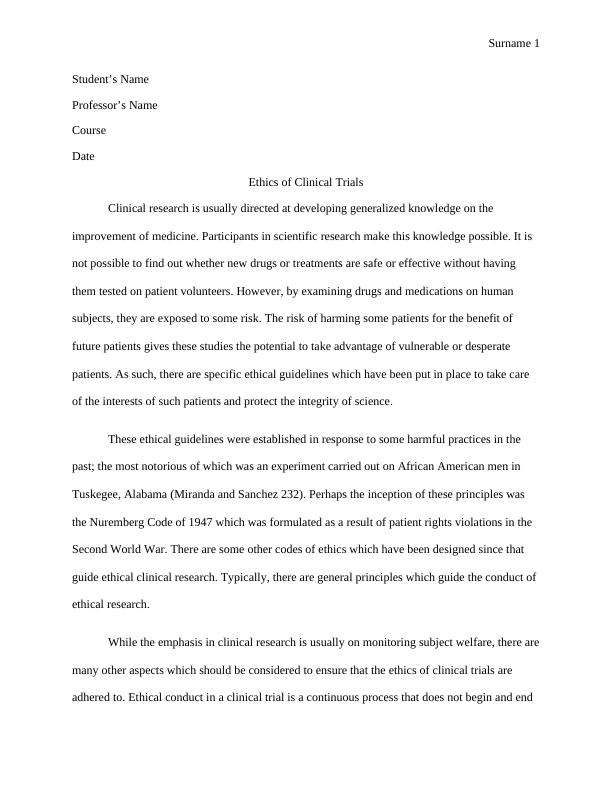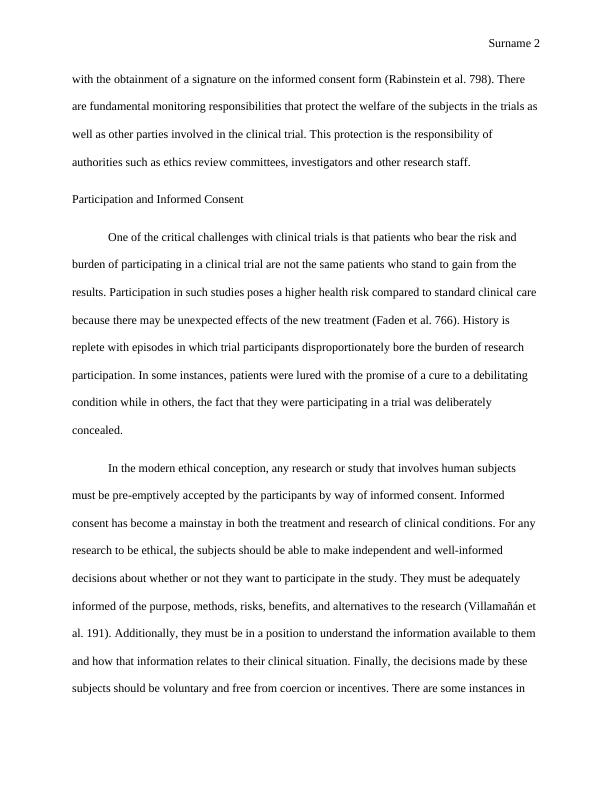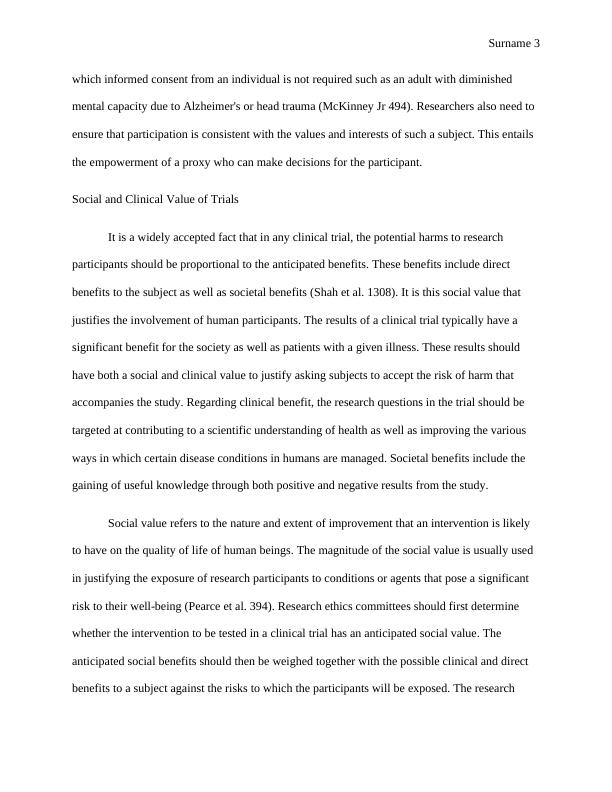Ethics of Clinical Trials
Added on 2023-05-28
9 Pages2813 Words182 Views
Surname 1
Student’s Name
Professor’s Name
Course
Date
Ethics of Clinical Trials
Clinical research is usually directed at developing generalized knowledge on the
improvement of medicine. Participants in scientific research make this knowledge possible. It is
not possible to find out whether new drugs or treatments are safe or effective without having
them tested on patient volunteers. However, by examining drugs and medications on human
subjects, they are exposed to some risk. The risk of harming some patients for the benefit of
future patients gives these studies the potential to take advantage of vulnerable or desperate
patients. As such, there are specific ethical guidelines which have been put in place to take care
of the interests of such patients and protect the integrity of science.
These ethical guidelines were established in response to some harmful practices in the
past; the most notorious of which was an experiment carried out on African American men in
Tuskegee, Alabama (Miranda and Sanchez 232). Perhaps the inception of these principles was
the Nuremberg Code of 1947 which was formulated as a result of patient rights violations in the
Second World War. There are some other codes of ethics which have been designed since that
guide ethical clinical research. Typically, there are general principles which guide the conduct of
ethical research.
While the emphasis in clinical research is usually on monitoring subject welfare, there are
many other aspects which should be considered to ensure that the ethics of clinical trials are
adhered to. Ethical conduct in a clinical trial is a continuous process that does not begin and end
Student’s Name
Professor’s Name
Course
Date
Ethics of Clinical Trials
Clinical research is usually directed at developing generalized knowledge on the
improvement of medicine. Participants in scientific research make this knowledge possible. It is
not possible to find out whether new drugs or treatments are safe or effective without having
them tested on patient volunteers. However, by examining drugs and medications on human
subjects, they are exposed to some risk. The risk of harming some patients for the benefit of
future patients gives these studies the potential to take advantage of vulnerable or desperate
patients. As such, there are specific ethical guidelines which have been put in place to take care
of the interests of such patients and protect the integrity of science.
These ethical guidelines were established in response to some harmful practices in the
past; the most notorious of which was an experiment carried out on African American men in
Tuskegee, Alabama (Miranda and Sanchez 232). Perhaps the inception of these principles was
the Nuremberg Code of 1947 which was formulated as a result of patient rights violations in the
Second World War. There are some other codes of ethics which have been designed since that
guide ethical clinical research. Typically, there are general principles which guide the conduct of
ethical research.
While the emphasis in clinical research is usually on monitoring subject welfare, there are
many other aspects which should be considered to ensure that the ethics of clinical trials are
adhered to. Ethical conduct in a clinical trial is a continuous process that does not begin and end

Surname 2
with the obtainment of a signature on the informed consent form (Rabinstein et al. 798). There
are fundamental monitoring responsibilities that protect the welfare of the subjects in the trials as
well as other parties involved in the clinical trial. This protection is the responsibility of
authorities such as ethics review committees, investigators and other research staff.
Participation and Informed Consent
One of the critical challenges with clinical trials is that patients who bear the risk and
burden of participating in a clinical trial are not the same patients who stand to gain from the
results. Participation in such studies poses a higher health risk compared to standard clinical care
because there may be unexpected effects of the new treatment (Faden et al. 766). History is
replete with episodes in which trial participants disproportionately bore the burden of research
participation. In some instances, patients were lured with the promise of a cure to a debilitating
condition while in others, the fact that they were participating in a trial was deliberately
concealed.
In the modern ethical conception, any research or study that involves human subjects
must be pre-emptively accepted by the participants by way of informed consent. Informed
consent has become a mainstay in both the treatment and research of clinical conditions. For any
research to be ethical, the subjects should be able to make independent and well-informed
decisions about whether or not they want to participate in the study. They must be adequately
informed of the purpose, methods, risks, benefits, and alternatives to the research (Villamañán et
al. 191). Additionally, they must be in a position to understand the information available to them
and how that information relates to their clinical situation. Finally, the decisions made by these
subjects should be voluntary and free from coercion or incentives. There are some instances in
with the obtainment of a signature on the informed consent form (Rabinstein et al. 798). There
are fundamental monitoring responsibilities that protect the welfare of the subjects in the trials as
well as other parties involved in the clinical trial. This protection is the responsibility of
authorities such as ethics review committees, investigators and other research staff.
Participation and Informed Consent
One of the critical challenges with clinical trials is that patients who bear the risk and
burden of participating in a clinical trial are not the same patients who stand to gain from the
results. Participation in such studies poses a higher health risk compared to standard clinical care
because there may be unexpected effects of the new treatment (Faden et al. 766). History is
replete with episodes in which trial participants disproportionately bore the burden of research
participation. In some instances, patients were lured with the promise of a cure to a debilitating
condition while in others, the fact that they were participating in a trial was deliberately
concealed.
In the modern ethical conception, any research or study that involves human subjects
must be pre-emptively accepted by the participants by way of informed consent. Informed
consent has become a mainstay in both the treatment and research of clinical conditions. For any
research to be ethical, the subjects should be able to make independent and well-informed
decisions about whether or not they want to participate in the study. They must be adequately
informed of the purpose, methods, risks, benefits, and alternatives to the research (Villamañán et
al. 191). Additionally, they must be in a position to understand the information available to them
and how that information relates to their clinical situation. Finally, the decisions made by these
subjects should be voluntary and free from coercion or incentives. There are some instances in

Surname 3
which informed consent from an individual is not required such as an adult with diminished
mental capacity due to Alzheimer's or head trauma (McKinney Jr 494). Researchers also need to
ensure that participation is consistent with the values and interests of such a subject. This entails
the empowerment of a proxy who can make decisions for the participant.
Social and Clinical Value of Trials
It is a widely accepted fact that in any clinical trial, the potential harms to research
participants should be proportional to the anticipated benefits. These benefits include direct
benefits to the subject as well as societal benefits (Shah et al. 1308). It is this social value that
justifies the involvement of human participants. The results of a clinical trial typically have a
significant benefit for the society as well as patients with a given illness. These results should
have both a social and clinical value to justify asking subjects to accept the risk of harm that
accompanies the study. Regarding clinical benefit, the research questions in the trial should be
targeted at contributing to a scientific understanding of health as well as improving the various
ways in which certain disease conditions in humans are managed. Societal benefits include the
gaining of useful knowledge through both positive and negative results from the study.
Social value refers to the nature and extent of improvement that an intervention is likely
to have on the quality of life of human beings. The magnitude of the social value is usually used
in justifying the exposure of research participants to conditions or agents that pose a significant
risk to their well-being (Pearce et al. 394). Research ethics committees should first determine
whether the intervention to be tested in a clinical trial has an anticipated social value. The
anticipated social benefits should then be weighed together with the possible clinical and direct
benefits to a subject against the risks to which the participants will be exposed. The research
which informed consent from an individual is not required such as an adult with diminished
mental capacity due to Alzheimer's or head trauma (McKinney Jr 494). Researchers also need to
ensure that participation is consistent with the values and interests of such a subject. This entails
the empowerment of a proxy who can make decisions for the participant.
Social and Clinical Value of Trials
It is a widely accepted fact that in any clinical trial, the potential harms to research
participants should be proportional to the anticipated benefits. These benefits include direct
benefits to the subject as well as societal benefits (Shah et al. 1308). It is this social value that
justifies the involvement of human participants. The results of a clinical trial typically have a
significant benefit for the society as well as patients with a given illness. These results should
have both a social and clinical value to justify asking subjects to accept the risk of harm that
accompanies the study. Regarding clinical benefit, the research questions in the trial should be
targeted at contributing to a scientific understanding of health as well as improving the various
ways in which certain disease conditions in humans are managed. Societal benefits include the
gaining of useful knowledge through both positive and negative results from the study.
Social value refers to the nature and extent of improvement that an intervention is likely
to have on the quality of life of human beings. The magnitude of the social value is usually used
in justifying the exposure of research participants to conditions or agents that pose a significant
risk to their well-being (Pearce et al. 394). Research ethics committees should first determine
whether the intervention to be tested in a clinical trial has an anticipated social value. The
anticipated social benefits should then be weighed together with the possible clinical and direct
benefits to a subject against the risks to which the participants will be exposed. The research

End of preview
Want to access all the pages? Upload your documents or become a member.
Related Documents
Non-clinical and Clinical Evaluation of Pharmaceuticallg...
|8
|2023
|20
Ethical Issues in Human Drug Testinglg...
|6
|1412
|108
ASSESSMENT 2 - A RIGHT TO EXPERIMENTAL DRUGSlg...
|5
|1301
|23
Responsibilities of Clinical Investigation Assignmentlg...
|6
|1328
|71
Clinical Trial Assessmentlg...
|13
|3146
|79
Ethics in Healthcare Research: Importance, Concerns, and Implicationslg...
|13
|771
|113
